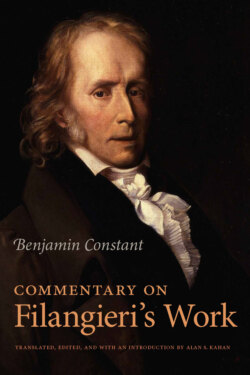Читать книгу Commentary on Filangieri’s Work - Benjamin de Constant - Страница 16
На сайте Литреса книга снята с продажи.
Оглавление[print edition page 21]
CHAPTER SIX On the Union of Politics and Legislation
It is really astonishing that among the many writers who have devoted themselves to studying law … each has only considered a portion of this immense edifice.
INTRODUCTION, P. 12.
Filangieri’s phrase contains the germ of a great truth, but he seems to have neither sufficiently understood it nor sufficiently developed it. He criticizes writers who have treated legislation separately from politics mostly from a literary angle, because they have not understood how to consider their subject as a whole, rather than from the much more serious perspective of the dangerous mistake they propagate. This mistake is all the more essential to combat because governments also propagate it with all their might. Governments would like to persuade peoples that good laws, ones appropriate for maintaining order among individuals, are all that is needed for security and general prosperity, without any need for recourse to constitutional institutions to protect these laws. This is to claim that a building’s foundations are not necessary for its stability. Legislation separated from politics offers the governed no shelter, and presents no obstacle to the governors. Outside political guaranties there are no means of preventing those who hold power from violating the laws they have established. Also, the despots who are the most jealous of their absolute domination have not failed to give their slaves marvelous law codes, sure that these codes would have only the value that the master’s will allowed. Two pages of a book, two words from a podium are better safeguards than the best-written law codes, those most perfect in appearance. They are better not only for freedom but also for justice, for that
[print edition page 22]
justice which each individual needs every day. For a law code is a dead and inert thing until the moment when men put it into practice. But if despots have to conform to it only when they feel like it, if no one can protest when they depart from it, all the merit of a law code vanishes.
This is the case with the distinction between legislation and politics, and equally with that which so many people want to establish between civil and constitutional freedom. The best legislation is worthless if a good political organization does not guarantee it, just as there is no civil liberty if constitutional liberty does not take it under its wing. Doubtless, even in countries ruled by arbitrary governments, all the civil liberties of all the inhabitants are not infringed upon, just as in all the countries ruled by the Turkish sultan, not all heads are cut off. But it is enough that such an infringement is possible, without any means of stopping it, for security to be nonexistent.
Today let us therefore challenge more than ever all efforts to distract our attention from politics and fix it on legislation. I say today more than ever, because today more than ever this trick is used as a last resort to fool us and give us the slip. When governments offer legislative improvements to peoples, peoples ought to respond by asking for constitutional institutions. Without a constitution, peoples cannot have any certainty that the laws will be obeyed. It is in constitutions, in the punishments they pronounce against unfaithful holders of authority, in the rights they assure citizens, in the universal publicity they ought to hold sacred, that the coercive force resides which is necessary to force the government to respect the laws. When there is no constitution, not only does the government make the laws it wishes, but it observes them as it wishes; that is, it observes them when convenient and violates them when advantageous. Then the best laws, like the worst, are only a weapon in the rulers’ hands. They become the scourge of the governed, whom they strangle without protecting, and whom they deprive of the right of resistance without giving the benefit of protection.
